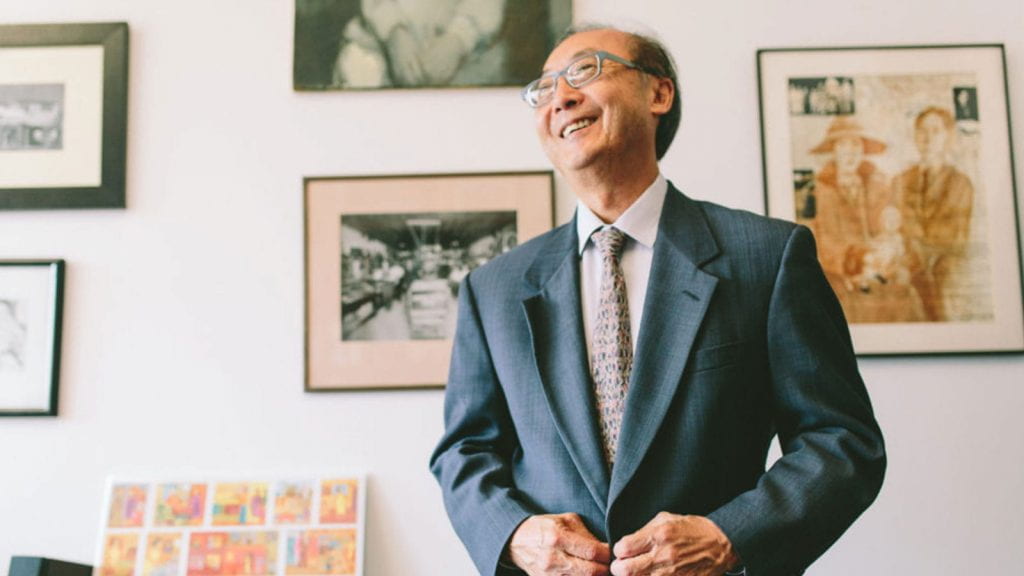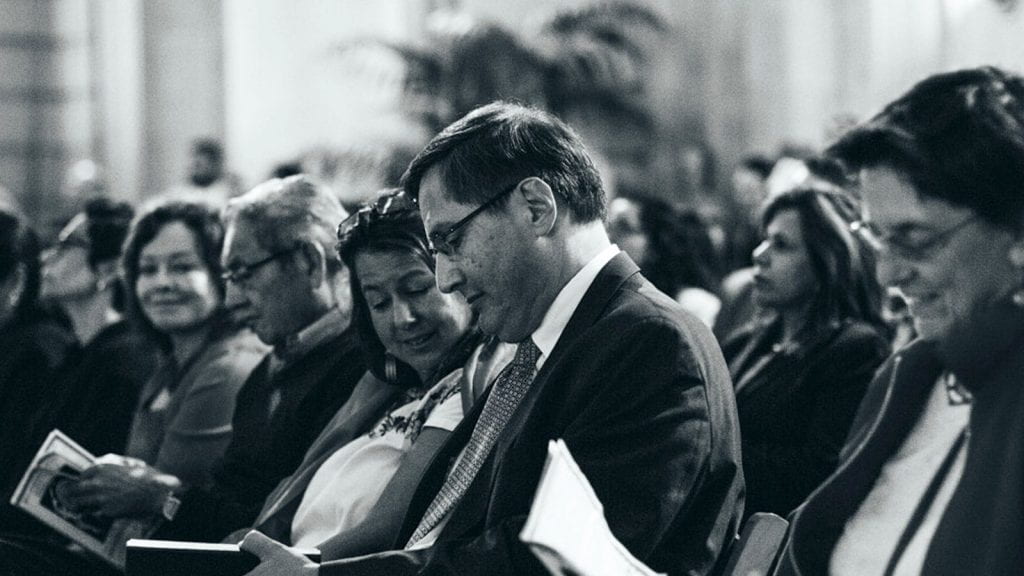When Bill Ong Hing completed law school, he intended to work as a legal aid attorney focusing on housing issues in low-income communities. Instead, he landed a job in immigration law. Along with continuing his work with immigrants through the University of San Francisco Immigration Clinic, Professor Hing’s scholarship and teaching is devoted to uncovering the current unjust practices and policies used against refugees and immigrants. During our discussion, we talked about his working with community organizations and the Immigration Clinic.

How did you first become interested in research?
I was a legal aid attorney for a number of years, and when you are a lawyer, you really do wonder about why the law is the way that it is. You wonder why the people you’re representing are in front of you. If you’re interested in them, it requires research. Sometimes it’s relevant to understanding your client better and your ability to represent them. I’ve always been interested in people’s backgrounds and what motivated them to be where they are and how they ended up where they are.
When you work with individuals who have very interesting life stories, you want to be able to do a good job for them. But also, when you are working in a community, you often hear and see very similar stories, and you want to know why are you seeing recurring problems. It might be housing issues. It might be discrimination issues. It might be language difficulties. When you realize that there’s some phenomenon that’s producing a problem, then you step back and explore the bigger picture and whether or not there are other ways of addressing it.
How has your research transformed from working with individuals and clients to doing larger legal scholarship?
When you start thinking about individual cases and situations, you realize that there are social phenomenon or laws that have wide influence on people. If you want to write about that as a scholar, you understand what policies led to a particular law and if those policies make sense. Another reason is wanting to come up with ideas that help society and your students understand why things are as they are and what it would take to make changes and make people’s lives better. Scholarship is an excellent opportunity to actually put those ideas down in writing. It complements, in my opinion, what activists do in the community.
What are some of the social issues you focus on?
My main focus has been on immigration policy and refugee issues. I’ve written a lot about why people get deported, and whether or not deportation laws make sense when the people have already gone to jail and they were here lawfully as refugees or immigrants, but they made a mistake. If they were citizens, they would have gone to jail, and when they got out, then they go on to lead their lives. But if you’re an immigrant, you get deported after you go to jail. I’m also writing more about the government’s stepped up deportation efforts against unaccompanied children and mothers and children fleeing violence from Central America. This is an unnecessary tragedy that is being visited upon these individuals.
I’ve also written about, how big of a role family is in immigration. For a number of ethnic groups, family immigration is the big issue. They want to be reunited with family members and there ae backlogs for people immigrating from different countries, like the Philippines or Korea or India. Scholarship is a way for me to write critiques of the system and how it could be made better. Recently, I’ve also written about racial justice on issues related to police racism and racial profiling. Not just with respect what we read a lot about today in Ferguson and police officers and black victims, but also racial profiling of Latinos and Asians that take place, that lot of people are not aware of.
What led you down this line of inquiry from family dynamics to current issues of racial profiling?
My interests in different areas of scholarship come from many sources, so it can come from clients in the Immigration Clinic or students who are raising very difficult questions that are not in the class materials. As a teacher, you’re trying to make the students think about whether or not things make sense. But very good and sharp students make the professor do that as well; so great ideas can be generated from students.
Other times, and perhaps most often, it’s from what’s happening with certain institutions and areas that I follow. Because I am interested in immigration, I’m interested when Immigration and Customs Enforcement or the Border Patrol arrest young people coming across the border that are fleeing persecution and instead of helping them apply for asylum, they end up in custody or in detention. Today in Europe, there’s a serious refugee situation with respect to Syrians and other Middle-Eastern refugees. And yet some countries of Europe are very open and warm in terms of their welcome for refugees, other countries are not. It’s an invitation to consider where the United States falls in that arena. Those are kinds of examples of common everyday things that are happening that give rise to my interest in scholarship and writing and researching about those issues.
As an academic, how does your work intersect different groups?
I think when you recognize that there are communities out there that we can work with and help, your experience as an academic is much more meaningful. I volunteer and I represent immigrants in partnership with other programs. Here at the law school, we represent immigrants in an immigration clinic that I helped to start. But there are also community-based organizations that need help in fundraising, so I’m on the board of several community-based organizations who have a range of fundraising needs.
Then there are politicians, both nationally and locally, that might be entertaining different legislative ideas and that’s an avenue where an academic can play a big role because academics can have credibility with policymakers. There also are community groups, and I don’t mean agencies but I mean PTAs and other organizations whose members want to stay informed and are very interested in what’s happening in society. When I get invitations to speak in front of groups, I’m happy to do that because I think that is part of our job as scholars and academics. One thing that I really like about the University of San Francisco is that it has a real commitment to the community and to social justice. My colleagues and the administration have always been very supportive of going out and doing community work and speaking with community groups.
Can you tell me more about the Immigration Clinic?
In the summer of 2014, there were large numbers of unaccompanied children that arrived at the border, mostly from El Salvador, Guatemala and Honduras and some from Mexico. In fact, that year 2014, about 65,000 arrived. And then there was another equivalent number of women and children who arrived. When that occurred, a certain number of them were released from custody and many of them were transferred to the Bay Area or to other parts of the country where they had friends or relatives. Once they were transferred here, all of them were put in deportation proceedings. Friends of mine in other nonprofit organizations asked if I would help out with cases and I did. I realized that there were just not enough legal services available. I was fortunate enough to raise money to hire a full-time attorney and a full-time office manager/paralegal to help with the cases. At the end of 2015, we had around 80 cases; today we have close to 100 cases They are all youth or women and children that are facing deportation, almost all Spanish speakers. The workload involves going to court a couple of times a week. It involves counseling people who have had some pretty sad and violent experiences; a lot of post-traumatic stress is involved because there’s been abuse at the hand of gang members, sometimes it’s domestic violence, other times it’s drug cartel-related violence. It’s hard to say no to representing these clients. That’s the reason the Immigration Clinic started.
How has the individual experiences of these people impacted you?
I’m outraged, to be honest, that our government actually would detain women and children who are not flight risks. They’re charged very high bond amounts of several thousand dollars or have to wear very uncomfortable ankle bracelets. I’m very disappointed that the government has made their deportation a high priority under the auspices of sending a message to others back in those countries that they shouldn’t come here. It’s very short-sighted because those people really don’t have a choice. They’re fleeing violence and it’s a choice between fleeing or staying and risking their life day to day. The way it’s affected me primarily is that it’s made me even more committed to train students to help do this work, to work with more community agencies to try to come up with a political strategy to convince the government to stop this, to work with other attorneys to help bring legal actions against the government to try to stop the deportations and detentions. It’s motivated me more. That’s the main impact this experience has had on me.
What do you see as your role as an educator to bring these experiences into the classroom?
I think that the classroom becomes much more interesting when you can bring in real issues. Obviously, in every class you always have to do a little bit of history and straight legal analysis, but in the immigration class that I teach, the students are much more interested when you talk about real clients who are facing the law that you are learning about. You understand how the law works against particular people or how it works to help certain people, or how the law of asylum would work, or how the law of family reunification would work in certain circumstances. Real experiences bring the class to life.
Do you find that students need convincing to pursue immigration law?
There are definitely some students who enter law school with a passion for social justice and some of them focus on immigration. Those are the students that I don’t need to coach. But at graduation, I’ve also been scolded by parents who said, “My daughter came to law school because I wanted her to go work downtown. But because of your influence, she’s going to be an immigration lawyer now.” I usually take that as a compliment even though sometimes it’s not intended that way. When some students hear and experience what I’ve been describing, it’s life-changing for them.
What brought you to USF?
I’m interested in social justice and public interest, and that’s very consistent with the mission of the law school, and the mission of the whole university. I love the focus on helping the needy and addressing the social needs of people who are low-income and disadvantaged.
I think that the support for public interest at USF is stronger than other schools. There’s such a strong sense of social justice here. For many years, each summer, the university sent a group of faculty and staff to El Salvador to learn about the history of El Salvador and the role that Jesuits, in particular, played in social justice battles in Central America. I was fortunate enough to go on one of those trips and it’s a great example of the university wanting to remind people of an important history of unfortunate violence and upheaval. The university wants us to remember that history, and examples like that serve as continuing inspiration and impetus for doing good work.
